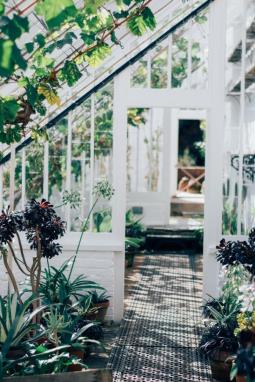
Self-sustaining communities that can talk to each other; sounds like something from the future doesn’t it? But Regen Villages is making this a reality – right now. The first Regen eco-village has begun building works in Almere, 25 minutes from Amsterdam, the Netherlands. The 15,500m² project will house 100 families and aims to be completed by 2018.
But what is a Regen Village?
Founded by James Ehrlich, a senior technologist at Stanford University, in 2015, Regen Villages has a holistic approach. A regenerative system combining new technology and renewable energy powered homes, with organic food production right on the doorstep.
The houses vary in size and are built inside a greenhouse “envelope”, with some even having terraces. Each home has a built in water collection system, solar panels and are passively heated. The community has a seasonal garden, biogas facility and aquaponics amongst other things.
The base of the villages is that the output of one system is the input to another. Waste from the homes is sorted into different categories. Bio-waste is used in the Biogas facility, whilst compost is used as food for livestock and small flies. The flies are fed to fish and the waste from both them and the livestock fertilises the seasonal gardens. The plants in the aquaponics facility and seasonal gardens produce fruit and vegetables for food, whilst the livestock and fish provide a source of protein. Rainwater is collected and stored at the houses and water produced at the biogas facility is also stored. Grey water is separated and used to irrigate the seasonal garden, whereas clean water is put into the aquaponics. Solar cells provide the energy for homes and also to the “smart grid” which can be used for charging electric cars.
Regen Villages, who are partnered with Danish architects EFFEKT, have been termed the “Tesla of ecovillages” paving the way for new innovative developments. Plans include villages being linked up to the cloud and being able to communicate with each other through the internet. In this way communities are self-reliant and off-grid but can still learn from each other.
What about the future?
At a conference held at Sliperiet, Umeå University, Sweden James Ehrlich spoke of the future for Regen Villages. After the completion of the Almere pilot, EU funding of a proposed 300 million euros (approximately $319 million) will enable projects in Sweden, Norway, Denmark and Germany to go ahead. These are aimed to be carried out during 2018-2022. Sights are then set on developments across Malaysia, Saudi Arabia, India, China and parts of the US, with government investments. As Ehrlich outlined, by targeting a challenging cold environment first, Regen Villages can be adapted to suit different climatic needs.
Off-grid sustainable greenhouse communities are not at all futuristic and Ehrlich is keen to make them a reality.
powkey Portable Power Station 350W, 260Wh/70,000mAh Backup Lithium Battery, 110V Pure Sine Wave Power Bank with 2 AC Outlets, Portable Generator for Outdoors Camping Travel Hunting Emergency
Now retrieving the rating.
$192.98 (as of April 24, 2024 13:58 GMT +01:00 - More infoProduct prices and availability are accurate as of the date/time indicated and are subject to change. Any price and availability information displayed on [relevant Amazon Site(s), as applicable] at the time of purchase will apply to the purchase of this product.)Amazon Visa
Now retrieving the rating.
$23.00 (as of April 24, 2024 13:58 GMT +01:00 - More infoProduct prices and availability are accurate as of the date/time indicated and are subject to change. Any price and availability information displayed on [relevant Amazon Site(s), as applicable] at the time of purchase will apply to the purchase of this product.)200W Portable Power Station, Powkey 120Wh/33,000mAh Power Bank with AC Outlet, 110V 6 Outputs Solar Generator External Battery Pack with LED Light for Home Use and Outdoor Camping
Now retrieving the rating.
31% OffAnker Power Bank Power Station 60,000mAh,Portable Outdoor Generator 87W with Smart Digital Display, Retractable Auto Lighting and SOS Mode, Home Backup(PowerCore Reserve 192Wh) for Travel, Camping
Now retrieving the rating.
$149.99 (as of April 24, 2024 13:58 GMT +01:00 - More infoProduct prices and availability are accurate as of the date/time indicated and are subject to change. Any price and availability information displayed on [relevant Amazon Site(s), as applicable] at the time of purchase will apply to the purchase of this product.)Foldable Solar Panel Charger 60W with 18V DC Output (11 Connectors) for 100W~350W Portable Power Stations Jackery/Rockpals/Flashfish/Enginstar, Portable Solar Generator for Outdoor Camping Van RV Trip
Now retrieving the rating.
$98.99 (as of April 24, 2024 13:58 GMT +01:00 - More infoProduct prices and availability are accurate as of the date/time indicated and are subject to change. Any price and availability information displayed on [relevant Amazon Site(s), as applicable] at the time of purchase will apply to the purchase of this product.)




